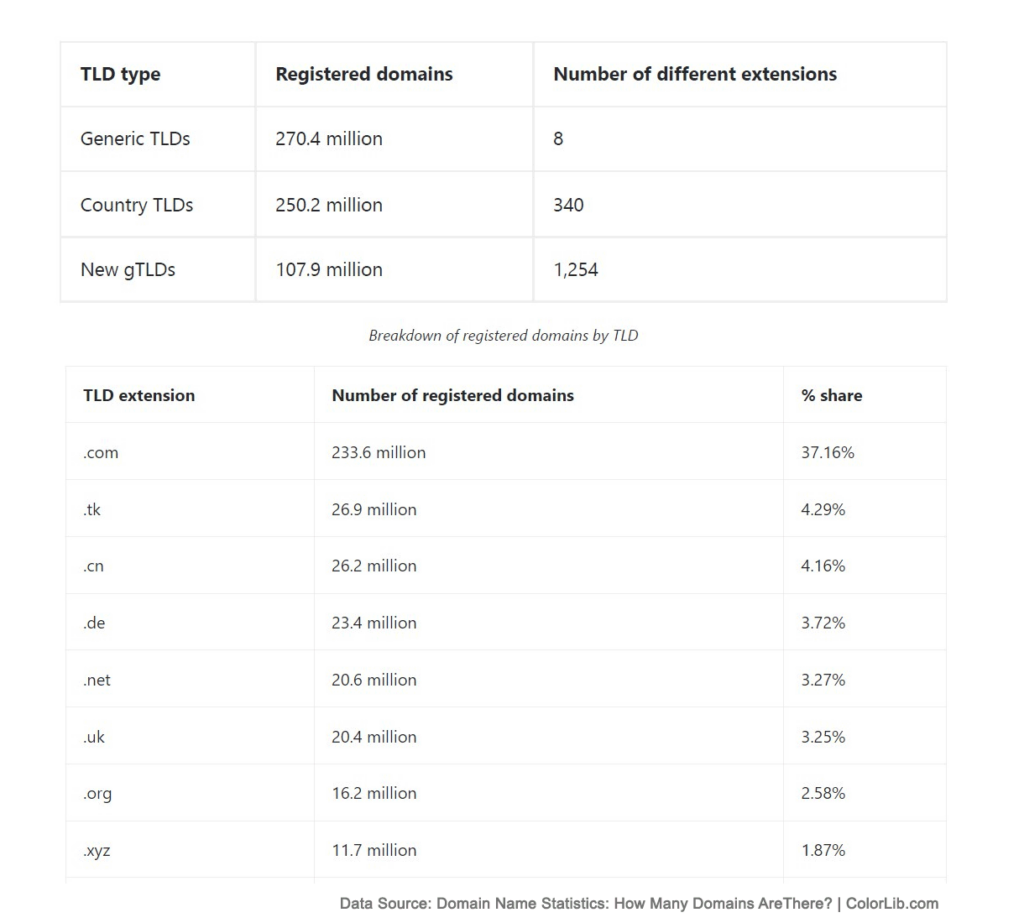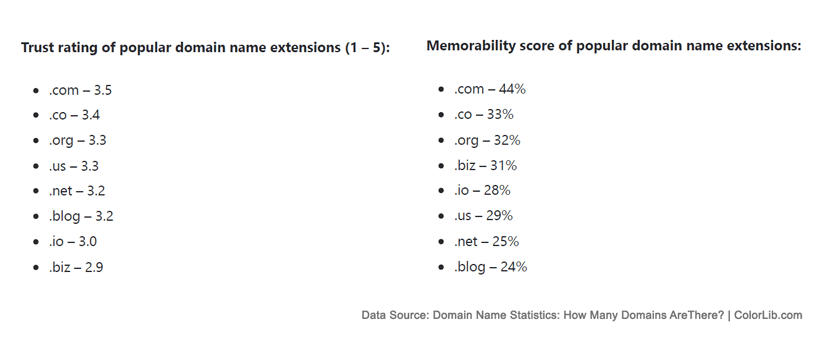There are 1,254 new TLDs covering fields such as finance, technology, science, etc., but only a small number of these extensions inspire trust and are suitable for business purposes.
New data released by Colorlib provides valuable insights into the number of registered domains and how people perceive them. When you breakdown this data to consider factors such as the number of domains registered, trustworthiness, and memorability, only a handful of TLDs are worth considering for your domain strategy.
Note: This list includes only TLDs available for public registration. While domains like .edu and .gov carry a very high credibility, they have been excluded from this list for that reason.
The Big Three
Since the early days of the internet, there have been three main domain extensions:
.com – Using anything outside of a .com needs to be approached with care because some TLDs evoke distinct impressions, and selecting the wrong one might not align with your business. There are over 233.6 million .com domain names, accounting for 37.16% of all registered domains, making .com the most common and most trusted domain extension by far.
.org – Great for teams and building trust, .org can serve as an effective forwarder for your company blogs. However, be cautious about using this extension as your main site outside of its intended purpose, as it can be confusing. People generally associate .org with organizations, communities, and non-profits, so it doesn’t make sense to run a shopping site on this extension.
.net – A true internet original, .net is a little more versatile than other extensions, but it’s best suited for internet-related products and services. It’s also excellent for collaboration and tools. .net websites were very popular in the early days, but you should be careful about using this extension outside of its intended purpose because it generally has a lower trust score compared to the other main extensions.
Interesting fact: There are more .net names registered compared to .org, but people generally remember and trust the .org extension more.

Worthy Alternatives
Country Code Top-Level Domains (ccTLDs) rank as the second-most common TLD type, boasting 250.2 million registrations. These domains denote specific countries, states, or territories and are represented by two-letter country codes (e.g., .us, .tk, etc.).
.co – Positioned as a solid alternative to .com, .co comes with its own set of considerations. While it offers a viable option, some users may encounter an inconvenience as certain keyboards auto-fill .co to .com, potentially adding extra steps for visitors to reach your site.
.us – Managed by the US government, .us carries a significant level of trust and credibility, particularly within the United States. However, it is important to note that this extension is primarily targeted at a US audience. Additionally, registering a .us domain entails special requirements, including the mandatory display of your company information in the public WHOIS database.
Niche Alternatives
These are country-specific TLDs that typically have lower trust and memorability metrics but are gaining popularity among modern tech startups. Over time, these extensions are expected to garner trust and credibility as more well-known companies continue to build on them.
.io – Generally associated with input/output, .io is well-suited for use in the tech and software industries. However, caution is advised when considering its use outside of this context. Running a non-tech business on a .io domain may seem out of place.
.ai – A domain with significant weight, .ai is particularly fitting for AI companies. Using it for other purposes can be confusing; for instance, operating an e-commerce store on an .ai domain might not align unless a unique AI algorithm is a central feature of its functionality.
Related: The Evolution of TLDs: Understanding Their Role in Online Branding

Conclusion
As you can see, despite there being nearly 1000+ extensions to choose from, very few carry the trust and credibility required to compete effectively. Selecting the right domain extension is central to establishing a strong online presence and earning the trust of your audience.
Unless you can secure an exact brand name match with an alternative extension, a .com should be your primary choice. Even in cases where you are inclined towards an alternative domain, it’s advisable to register the .com if available and use it as a forwarder. This is because some users habitually type .com for all websites they visit, ensuring that you capture as much traffic as possible.
Data Source: Domain Name Statistics by Colorlib
You May Also Like
- Effective Strategies for Protecting Your Domain from Spoofing and Email Spam
- Assigning User Account IP for Outgoing Mail Sending in Postfix (CWP/CentOS/Ubuntu)
- 10 Essential Tips for Choosing the Right Domain Registrar
- Simplify Your Checkout Process with HTTP 402 Status Codes: No-Subscription Website Payments
- How to Install the Recode Extension on PHP 7.4: A Step-by-Step Guide
